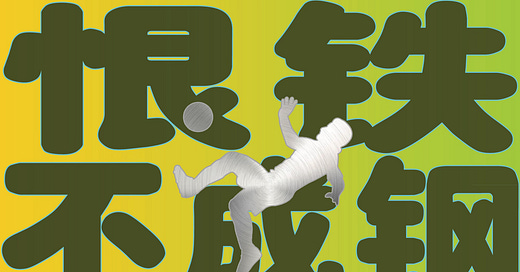"Wishing iron could be steel" — Phrase of the Week
Chinese fans want more from their football team, but they're not getting it.

Our phrase of the week is: "wishing iron could be steel" (恨铁不成钢 hèn tiě bùchéng gāng)
Context
The Chinese men’s football team was thrashed 7-0 by Japan last week in the third round of Asian qualifiers for the 2026 World Cup. The humiliation against Asia’s top-ranked team marked China’s worst defeat in World Cup qualification history, falling just short of their record 8-0 loss to Brazil in 2012.
Fans, the media, and social media users were quick to criticize the team.
Among the most quoted reactions was from Fàn Zhìyì 范志毅, a former Chinese international footballer and team captain, who also previously played club football internationally including at Crystal Palace, Dundee, and Cardiff City. Fan vented his frustration in the media, saying:
The opposition was allowed to score too easily. If I wasn’t so far away, watching it would really make me want to jump into the Huangpu River.
这比赛对面球进得太容易了,要不是这里离得远,看得我真的想跳进黄浦江了。
Zhè bǐsài duìmiàn qiú jìn de tài róngyì le, yào búshì zhèlǐ lí de yuǎn, kàn de wǒ zhēn de xiǎng tiàojìn Huángpǔ Jiāng le.
Seeing the national team repeatedly make mistakes and allow the opponent to score so easily, Fan Zhiyi's disappointment and anger were palpable.
Fan Zhiyi was angry because he felt like wishing iron could be steel. He hopes that the national football team can deeply reflect on their failures, learn from them, and continually make improvements.
范志毅的愤怒,其实是一种恨铁不成钢的心情。他希望国足能够痛定思痛,从失败中汲取教训,不断提升自己的实力。
Fàn Zhìyì de fènnù, qíshí shì yì zhǒng hèn tiě bù chéng gāng de xīnqíng. Tā xīwàng guózú nénggòu tòngdìngsītòng, cóng shībài zhōng jíqǔ jiàoxùn, búduàn tíshēng zìjǐ de shílì.
And with that we have our Sinica Phrase of the Week!
What it means
"Wishing iron could be steel" is a Chinese idiom. Unlike most other four-character idioms, this one has five characters, which translate as: "wish iron" (恨铁 hèn tiě), "not become steel" (不成钢 bùchéng gāng). In this context, the character 恨 hèn means “wish for” and not “hate”.
The phrase originates from one of China's greatest classic novels, Dream of the Red Chamber (红楼梦 hóng lóu mèng), published in 1791 and written by Cáo Xuěqín 曹雪芹. The novel explores the decline of a wealthy family during the late Qing Dynasty, touching on themes of social decay, family loyalty, and personal betrayal. It delves into the complex dynamics within the family and the societal pressures contributing to their downfall.
The idiom appears in Chapter 96:
"It's only because Baoyu isn't making progress that I'm often angry about him; it's simply a matter of 'wishing iron could be steel.'"
“只为宝玉不上进,所以时常恨他,也不过是‘恨铁不成钢’的意思。”
“Zhǐ wèi Bǎoyù bú shàngjìn, suǒyǐ shícháng hèn tā, yě búguò shì ‘hèn tiě bù chéng gāng’ de yìsi.”
This conversation takes place between Baoyu's father and grandmother, discussing whether they should arrange a marriage for him or let him follow his own path.
The phrase “wishing iron could become steel” reveals the father’s deep care for Baoyu, but also his frustration that his son isn’t living up to expectations.
The idiom expresses the same sentiment today in modern Chinese as it did in the Qing dynasty. It reflects a feeling of disappointment and frustration when someone falls short of their potential, paired with a strong desire to see them improve and succeed.
This phrase is often used when someone is dissatisfied with another’s lack of progress and is eager for them to do better—much like Fan Zhiyi’s frustration with the underperformance of China’s national football team.
Andrew Methven is the author of RealTime Mandarin, a resource to help you learn contemporary Chinese in context, and stay on top of the latest language trends in China.
Read more about how this story is being discussed in the Chinese media in this week’s RealTime Mandarin.




